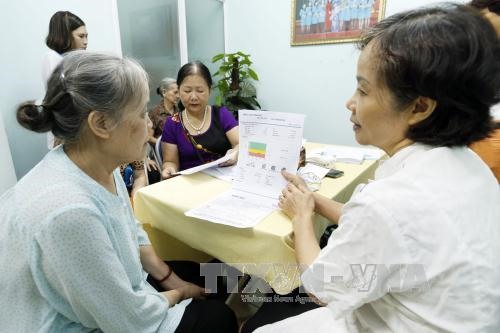 Society
Society

HelpAge International is launching the first findings of a study of Older People’s Associations (OPAs), conducted by the Oxford Institute of Population Ageing in four Asian countries, Cambodia, China, Myanmar and Việt Nam.
 |
| A medical worker gives consultancy on health care for an old woman. — VNA/VNS Photo Dương Ngọc |
HÀ NỘI — HelpAge International launched on Tuesday the first findings of a study of Older People’s Associations (OPAs), conducted by the Oxford Institute of Population Ageing in four Asian countries in Hà Nội.
A team of researchers visited a total of 72 OPAs in Cambodia, China, Myanmar and Việt Nam to collect data and to explore members’ views on the achievements of the OPAs and the challenges they faced.
"This research shows that the older people’s associations can complement government policies and programmes responding to population ageing and provide clear benefits to older people, their families and communities,”said Eduardo Klien, regional director of HelpAge International Asia Pacific Regional Office.
OPAs are innovative community-based organisations that actively engage senior citizens as agents of change. This type of organisation has been established in different countries in East and Southeast Asia for over 10 years. Việt Nam has 1,145 OPAs.
HelpAge International views that the OPA approach is a platform to improve the quality of life and strengthen the voice of older people.
In 2015, the Oxford Institute of Population Ageing, under University of Oxford, was commissioned by Age International, the World Health Organisation Regional Office for the Western Pacific and HelpAge International, to carry out the research study of OPAs to assess the impact of their approach on key aspects of the wellbeing of older people -- health and care, income security and social integration.
Kenneth Howse, researcher of Oxford Institute of Population Ageing, stated in the report, “They (OPAs) can be seen as a single, community development approach to improving the wellbeing of older people in low- and middle-income countries in the region.” — VNS




